25th December 2020 – Shabbat is almost here
And today we’ll share a very special poem, Chrystus, by Julian Tuwim, poet born in Łódź, Poland, in 1894, sang by Janusz Prusinowski, my dear collaborator, musician, composer, singer, born in Mława, Poland, in 1969.

Hello, how are you? I hope well. I know that many Catholics will read these words. I have been fortunate today to be able to combine in this edition the usual theme, that of Jewish culture, with the theme that occupies many people today. Today is Christmas Day for Catholics and in the poem we are going to hear, set to music by Janusz Prusinowki and performed by him and his Kompania, Julian Tuwim gives voice to Jesus Christ. You can find it below, translated into English.
Apart from the religious questions that each of us may or may not share, I understand the poem also with another reading: it tells me about the dedication, the extreme devotion, of some people in terms of a goal, a vision, very powerful that guides them. I know some people like that, with some of them I share the vision and this is a privilege. So, I feel quite identified with the non-literal meaning of the song and it touches me personally. I hope that it will also give you something transcendental.
| Share the joy of music and learning with your beloved ones. Share MBS. Thank you in advance. |
.
Julian Tuwim, the discoverer of the musicality of the Polish language
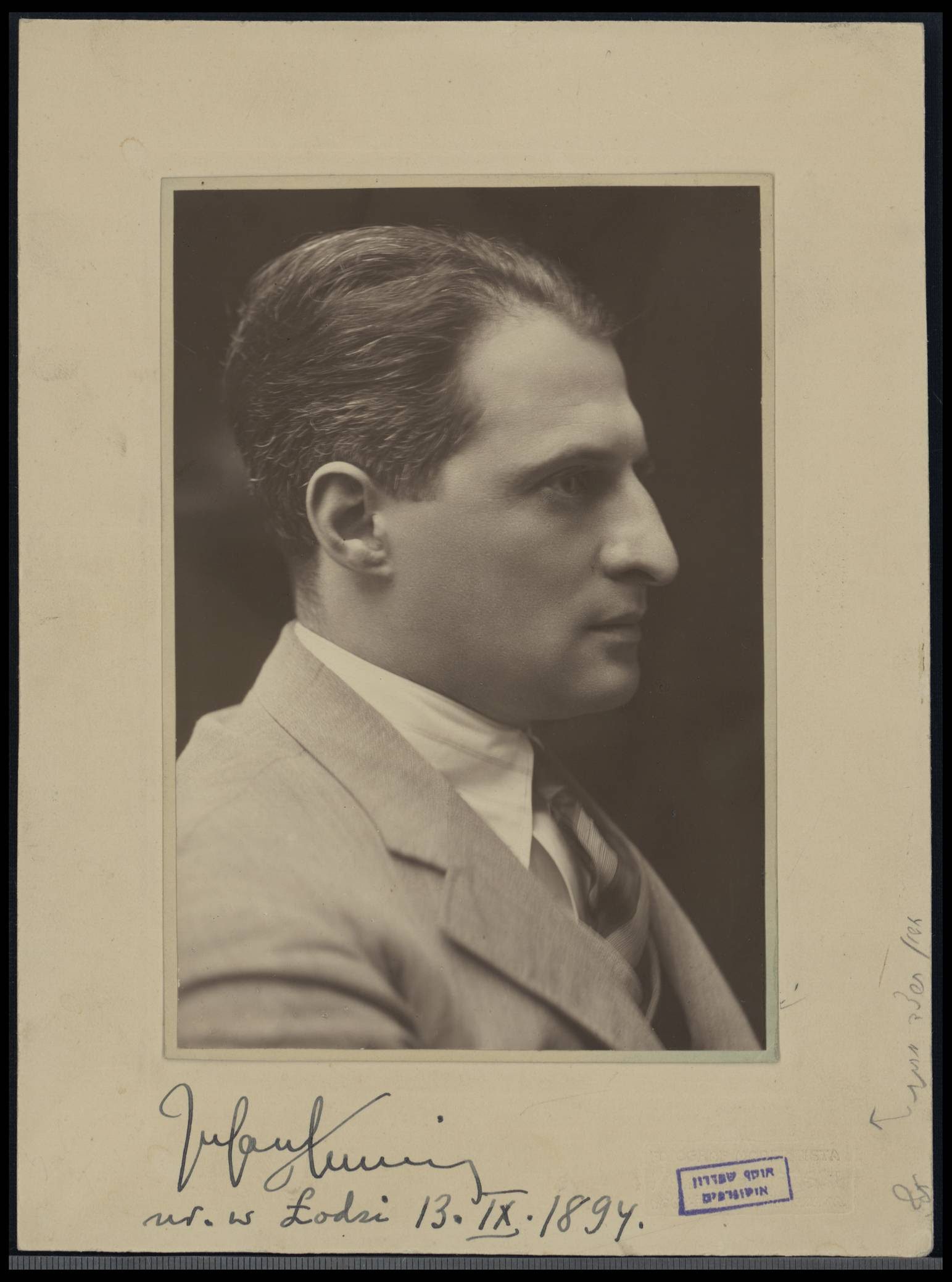 The title of this part is not my invention. The “discoverer of the musicality of the Polish language” is a phrase I have found in The Private Library. There, Elvira Groezinger is quoted: “although Tuwim probably was Poland’s most popular lyric poet of the interwar years, today he often is considered too difficult to translate because of his frequent word inventions and wide linguistic range (which led one early critic to call him the “discoverer of the musicality of the Polish language”).”
The title of this part is not my invention. The “discoverer of the musicality of the Polish language” is a phrase I have found in The Private Library. There, Elvira Groezinger is quoted: “although Tuwim probably was Poland’s most popular lyric poet of the interwar years, today he often is considered too difficult to translate because of his frequent word inventions and wide linguistic range (which led one early critic to call him the “discoverer of the musicality of the Polish language”).”
I only know Julian Tuwim’s after Janusz Prusinowski’s work and the more I get to know about him, the better I like him. Let’s discover more about him.
This portrait photo is dated 1933, it is available on Wikipedia, here. The painting below (available here) is a portrait by the writer and painter Stanisław Ignacy Witkiewic (you can learn about his life in Britannica for a brief bio and in Culture.pl if you want more).Julian Tuwim was a writer of several lines of activity. As Janusz explains below, and as most of the Poles know, he wrote many poems for children. He also made many satirical texts and cabaret texts and song lyrics. I wonder what would he have thought about this musicalization of his poem Chrystus by Prusinowski.
For Tuwim’s bio I will use and summarize the biography available in Culture.pl, by Bartłomiej Szleszyński, Department of Polish Philology, University of Warsaw, published in April 2003. Culture.pl is, by the way, a very interesting website about Polish culture, by the Institute Adam Mickiewicz. And I will link some other pages too.
So, his bio in brief:
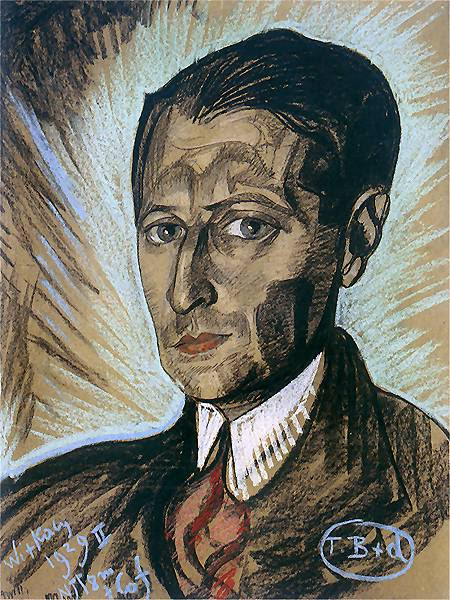 Julian Tuwim was born in Łódź in 1894 and died in 1953 in Zakopane (mountain town, two hours to the South from Krakow, near the border with Slovakia). He was an active writer since he was very young. Already in his 17 years old, he started to publish translations of Polish poems into Esperanto (note that Esperanto was created by another Polish Jew, Lejzer (Eliezer) Zamenhof) and as a poet, he debuted with the poem Prośba (Request) in Kurier Warszawski (1913).
Julian Tuwim was born in Łódź in 1894 and died in 1953 in Zakopane (mountain town, two hours to the South from Krakow, near the border with Slovakia). He was an active writer since he was very young. Already in his 17 years old, he started to publish translations of Polish poems into Esperanto (note that Esperanto was created by another Polish Jew, Lejzer (Eliezer) Zamenhof) and as a poet, he debuted with the poem Prośba (Request) in Kurier Warszawski (1913).
In 1919 he co-founder the poetic group Skamander. According to Kulturalna Polska: “The name “Skamander” was taken from the mythological river flowing around Troy. Moreover, it is a reference to the famous sentence from the modernist drama Akropolis (1904) by Stanisław Wyspiański: Skamander shines, shining on the Vistula wave.” If you want to learn more about Skamander, The National Ministry of Culture of Poland has a useful page that you can automatically translate with reasonably good result, here. Between many other works, he collaborated with Polish Radio from 1927 (he was artistic manager of the humour section from 1935). He was a founding member of the ZAiKS Association of Authors and Composers from 1919.
He spent World War II in exile – in Romania, France, Portugal and Brazil, from where he travelled to New York in 1942. During the exile, he continued working for several media related to Poland. He returned to Poland in 1946 and settled in Warsaw.
He got big recognition in life, despite which he also received criticism for various reasons: “He was attacked by younger writers (especially from avant-garde circles, who accused his work of sentimentalism and traditionalism) and also, for completely different reasons, by antagonists from nationalist circles – they reproached him for his family’s Jewish origin as well as were outraged by those works of his which carried a blatant pacifist message, such as Do generałów / To the Generals and Do prostego człowieka / The Common Man.” (from Culture.pl)
If you want to delve in the personality of Julian Tuwim and his position about the Jewish and the Polish identities, check this very interesting article from The Jerusalem Post from one year ago, by Myer Siemiatycki, Professor Emeritus of Politics at Ryerson University in Toronto.
And if you want to read some of his poems, check this blog, Pacze Moj, includes 22 poems in Polish and English.
| Share this with a friend, right from here |
:
The Jews in Łódź
As you know, MBS is a trip in place and in time and because of the relevance of the Jewish population in Poland during the XIX and XX centuries, Poland is a usual destination. I am thinking that the current time is a moment in which the Jewish heritage is becoming more visible and strong and it is great news.
Let’s travel to Łódź, the birth land of Julian Tuwim. According to the Holocaust Encyclopedia, “The Jews of Lodz formed the second largest Jewish community in prewar Poland, after Warsaw. […] In early February 1940, the Germans established a ghetto in the northeastern section of Lodz. About 160,000 Jews, more than a third of the city’s population, were forced into a small area.”
The website of the Fundacja Monumentum Iudaicum Lodzense is very useful and includes a brief History of the Jews in the city. I will just copy some parts, visit this website to read more:
“Till 1782, the only Jews in Lodz were the local tavern keepers. The historical-political changes which took place on the turn of the 18th and 20th century allowed the development from the small, agricultural town into a strong industrial center and with it an influx of the Jewish population. […]In the 60s of the 19 century Jewish population counted about 30 000 people. More than 1/3 of manufactures were in the hands of Jewish industrialists. In these years big manufactures fortune were established.
In the 80s of the 19 century, following the pogroms in the Moscow District, a big wave of Russian Jews fled to Lodz. At the end of the century, the number of Jewish residents of the city came near to 100 000. […] On the eve of IIWW the Jewish population in Lodz numbered 233.000 people, which was near of 35% of all residents of Lodz.”
According to this article from The First News (magazine of Polish news in English), “The Nazis established the second largest ghetto in occupied Europe in Łódź, and at one time it held more than 200,000 Jews. During the occupation the Nazis also burned down 39 synagogues in the city.”
The Synagogue of Reicherów is the only one that hosts services nowadays. This picture is from the website of Sztetl, by the POLIN Museum:
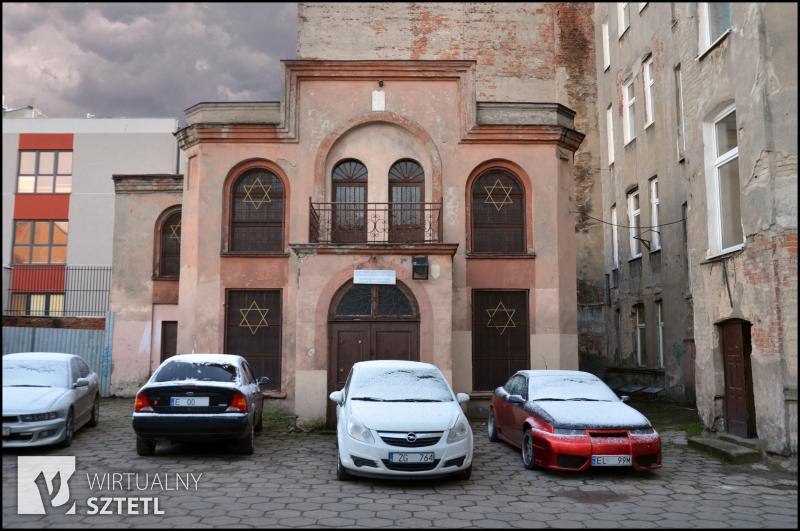
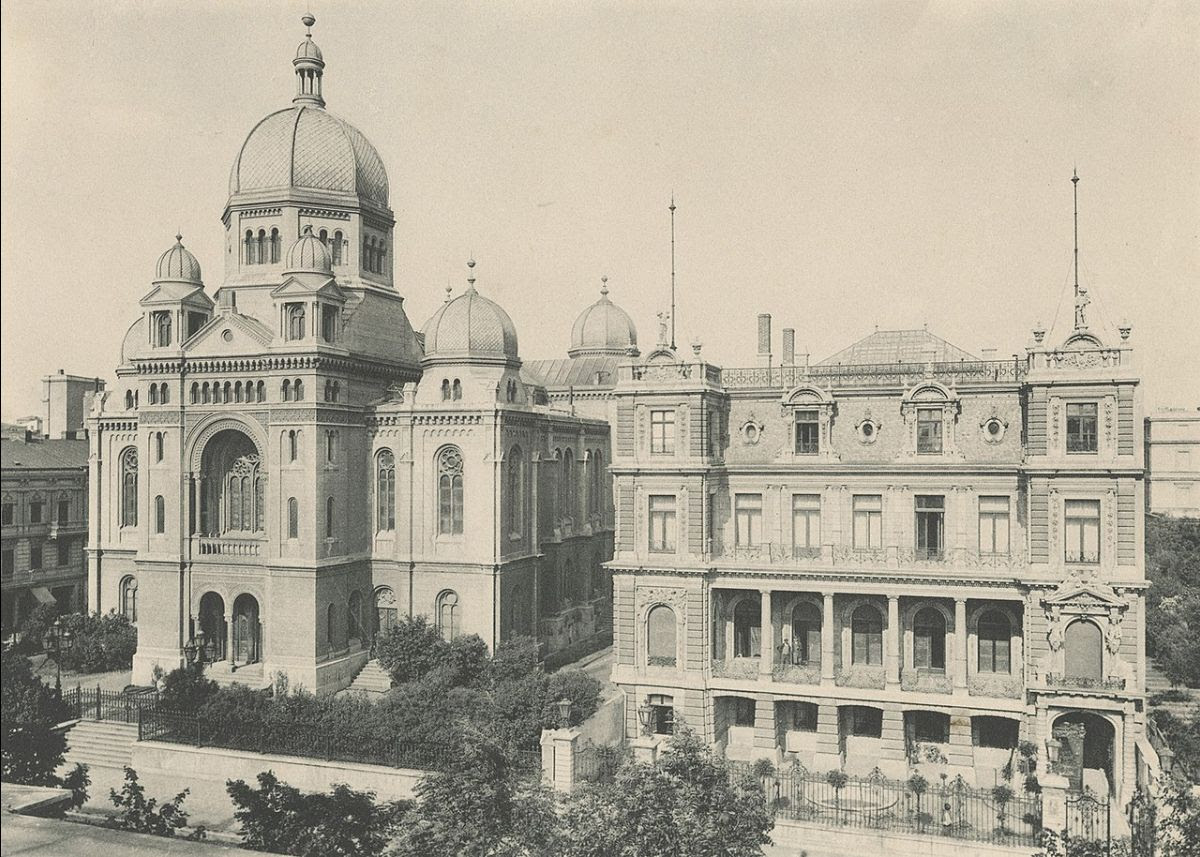
Here below, on the left you see the Stara Synagogue. The one on the right is the Ezras Israel Synagogue. The pictures are of public domain too, and I got them from here and here. In the same article from The First News, it is mentioned that “The Jewish community in Łódź is planning to build the first new synagogue in Poland since the Second World War.” And that the Ezras Israel Synagogue will be used as the model for the new synagogue. The project includes also the building of a hotel, an educational center and a kosher kitchen.
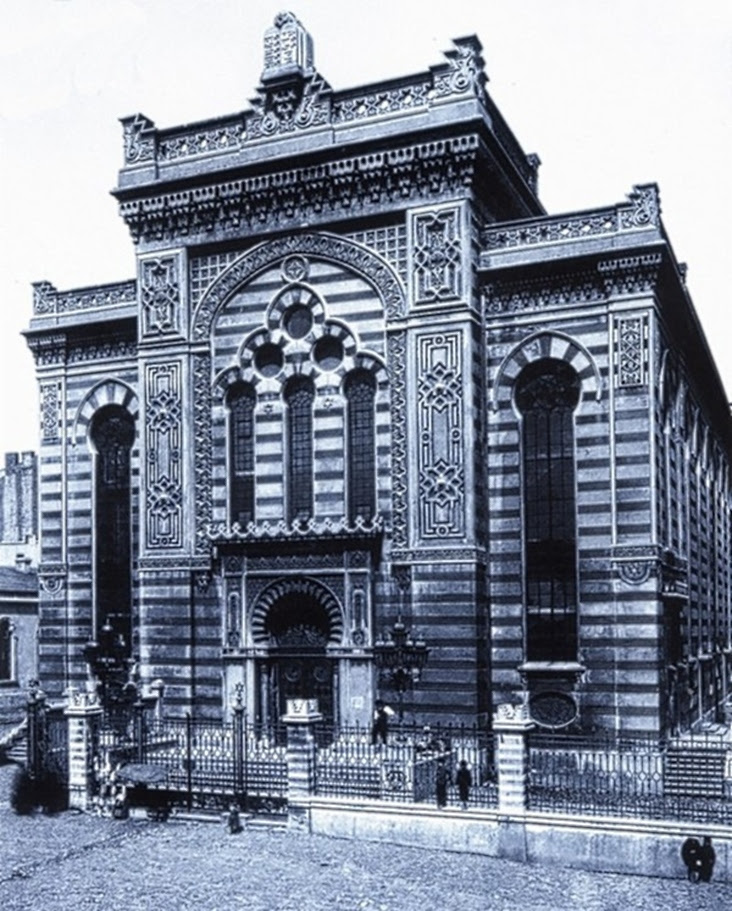 |
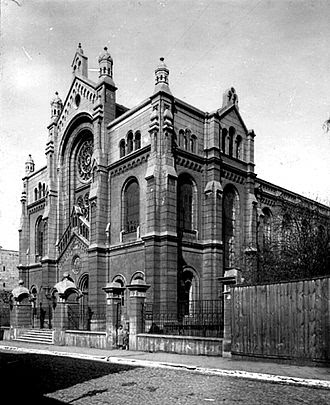 |
Łódź has one of the largest Jewish cemeteries in Europe, with 180,000 graves. It is announced as the biggest in Europe in several sites but it is not so clear, as some others claim to be the biggest, like the one in Weißensee, near Berlin, or the one in Warsaw.

Janusz Prusinowski about Julian Tuwim
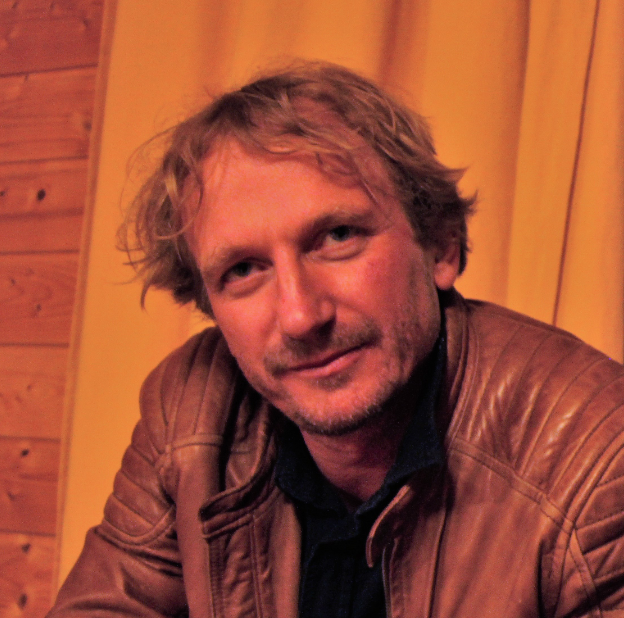 Music Before Shabbat – What is the meaning of Julian Tuwim for you, in your life?
Music Before Shabbat – What is the meaning of Julian Tuwim for you, in your life?
Janusz Prusinowski – Tuwim’s poetry I heard firts in my childhood – as every Pole – as he wrote great poems for children, such as “Lokomotywa” (the Stream Locomotive) and many others. Then in schools I got to know other parts of his very creative poetic life, such as poetry collection “Kwiaty Polskie” (Polish Flowers) and many, many others.
As they are appreciated part of polish literature we (the students) had to know some of them by heart. I remember I liked them.
Then I got Tuwim’s “Collected Poems” as a wedding present from my friend. Since that time I have read this book a few times, coming back to it when I need to answer some questions or need to “talk together” with “a distant friend” – somebody sensitive, emotional and considering human nature. Among Tuwim’s poems I find my own feelings from my youth and from my recent adventures. Tuwim became some part of my life.
MBS – Why did you make the music for this piece, Skarga? Was it easy, did the poem ask you for that music, or was it difficult?
JP – This is my old dream: to sing beautiful poems, that I identify with to traditional melodies, that I identify with too. Playing emotional, unique melodies of village mazurkas I often ask myself: what words, what poem could express similar feelings. Mazurek, oberek use to sung as improvised, short couplets, sometimes profound, sometimes with a joke, sometimes reflective, sometimes ribald – as life is. When I read Tuwim’s poem I understood it was a ready song, with natural mazurek phrase and rhythm. It suited to many traditional melodies, I tried some of them. Finally I choose the one, from famous, blind village accordionist Stanislaw Stępniak. Its first part is going high, as singing “to heaven”, as shouting to be heard by God, then second part lowest a bit the emotional level, comes back to earth, accepting the shape of our life, our bodies, our – and other people’s – limitations. The melody I used to sing without words, searching for the right ones, then the Tuwim’s ones fit finally perfectly, gave another dimension and opened new musical space.
MBS – The music, does it follow any style or shape from the traditional music from Poland?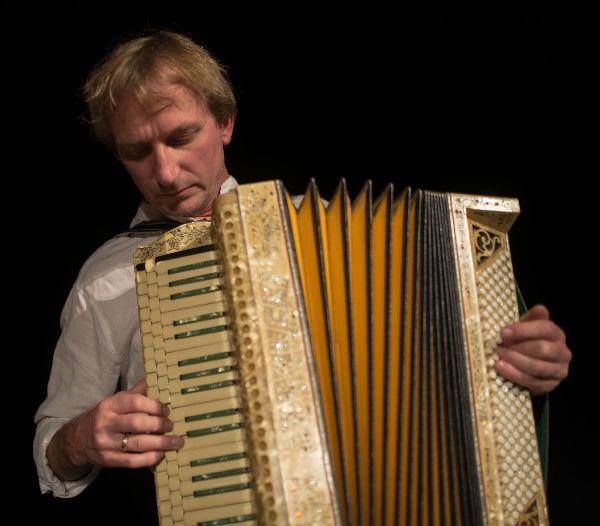
JP – The music is both traditional and contemporary. The melody is played and sung in Radom region with many local versions and variants. My versions I learned from Stanislaw Stępniak, the most famous accordionist / harmonia player (blind) of that region. Drumming philosophy is also rooted in traditional playing of Jan Wochniak, the drummer of Stępniak’s band. In 60s and 70s (XX century) wind instruments became popular in the village too, many bands played with trumpet, clarinet or saxophone and such a sonorous sound got really popular those years. Playing – with my Kompania – with trumpet and other wind instruments we – on one hand – built the connection to those traditional music evolution 50 years ago, on the other open to contemporary sensitivity and improvisational talents of my band’s members. All of them – Michał, Piotr, Szczepan – and especially me love improvising, creating dialogues among the group, playing “here and now” and expressing ourselves.
MBS – Anything you would want to add?
JP – When I sing and play Skarga I have quite a special feeling of happiness and “mission”. I love the song.
– You can learn more about Janusz and his work, here and here. –
Listen to Mazurek Skarga
Click the picture to listen to the recording:
And here you are a live version, recorded in Madrid in may 2015.
Lyrics
Chrystus (Julian Tuwim)Nie skarżę się, mój Ojcze, nie skarżę się, mój Panie, Nie skarżę się, mój Ojcze, że tak samotnie chodzę, Obchodzę chaty z wieścią: “zbliża się, z łaski nieba”. Czyli są słowa moje tak bardzo niepojęte? Nie widzą, że niebiosa rozwarły się narodom, Lecz się nie skarżę, Panie, że tak strapiony chodzę, Ptaszkowie mają gniazdka i liszki mają schowy, Lecz to nie skarga, Panie… Spraw jen w bliskim cudzie, |
ChristI do not complain; Father; I do not complain, My Lord. I do not complain. Father, that I must walk alone. I pass the huts with the news: “It’s coming, by heaven’s grace” How can they find my words so hard to understand? They do not see that the heavens have opened up to the nations, But I do not complain, Lord, that I walk so distressed, The birds have little nests, there’s shelter for every bug. But that is no complaint, O Lord, just use your Mighty Will. |
I hope you’ll like it and, if so, feel free to share it and invite your friends to join us.
It is as symple as sending … this link to sign up
Shabbat Shalom.
Araceli Tzigane | Mapamundi Música
